
Christmas support!!!...buy a pig, support a volunteer, enable scholarships
![]() Cairdeas
Cairdeas
![]() 29th November 2016
29th November 2016
We thank you so much for your generous support over the years! Your contributions however small they may be make a lasting contribution to palliative care in Uganda!
Our appeal this year is to ask for your support towards services of a volunteer, buying a breeding pig and training for a palliative care nurse.
Support a volunteer
Volunteers are an integral part of the Palliative care service at MPCU, they give practical, psychosocial, spiritual and practical support to our patients and their families in Mulago and now Kiruddu and Kawempe hospitals. For £10 you can pay to facilitate the services of one of the volunteers for a week.
Ronald has worked with the MPCU volunteer team for 3 years now. He says; “I have dedicated my time, knowledge and skills in helping the terminally ill patients who are in too much pain and almost dying. I dedicate 3 days a week to offer psychosocial, spiritual and practical support to these patients. Still so many times I have worked with patients who have no carers and I have to offer much time in helping them with services like collecting medicines for the pharmacy, taking them for investigations like x-rays, scan and helping them with physical exercises if needed. I also work with service providers in the hospital such that I am able to link my patients to them in case they need those services. Again in some cases patients are discharged from the hospital and are referred other health facilities near their homes where they can continue with medication so I do follow up on such patients to ensure they continue taking their medication”
Donate a pig
We are also starting our new pig farm project so as to provide a sustainable source of funds for our pastoral and social support programme. This is an exciting new venture as we try to achieve sustainability. For £40 you can donate an adult breeding pig to help us kick start the project which will go on to provide the volunteer programme with long term funding.
Train a staff member
Building capacity within team members is vital if we are to see palliative care develop within Uganda. For £300 you can provide a scholarship for one month of a palliative care degree for a team member.
Esther received a five day link training in 2012 by the MPCU team and has since then been working on the surgical ward as a link nurse, giving generalist palliative care and referring complex cases to the MPCU team. In April this year she joined the MPCU team! Esther says “Before I had the training patients who were dying could be neglected as the staff thought they could do nothing for them. But since the teaching I realised there is much I can do for these patients. I can allow them to die in peace and though they were suffering they had a smile on their face because of the care they received. Since working with the team I have learned much more. Before on the ward most of the times I would have worked alone but now I work as a team who have much knowledge that I can learn. I learn how to council them, how to care for all patients with life-limiting illness. It has changed me. It has changed my attitude.”
Esther now needs to enrol for an advanced training in Palliative care so she can provide better service to her patients.
Please consider supporting by clicking on our support button and donating online https://cairdeas.org.uk/get-involved/donate or by cheque to
Cairdeas International Palliative Care Trust 15 Kings Cross Avenue Aberdeen. AB15 6FS. Drop us an email operations@cairdeas.org.uk so we can acknowledge your gift and also send you progress update and a photo!!
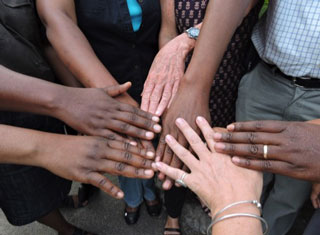
Working together with your help
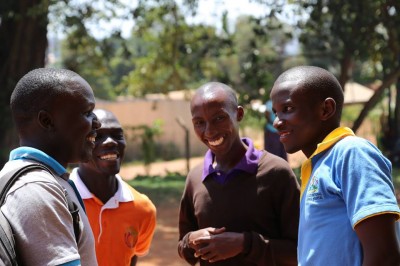
Our wonderful volunteers including Ronald

This is how our pigs will look!
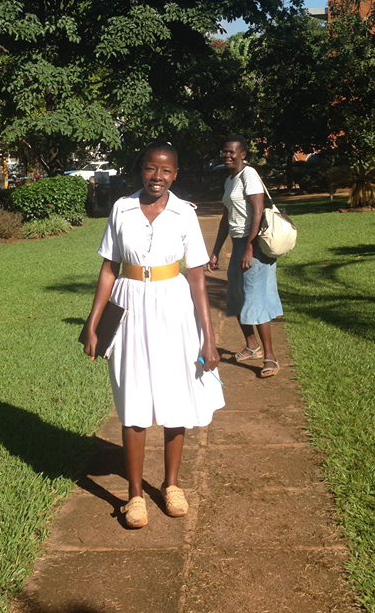
Esther and her story
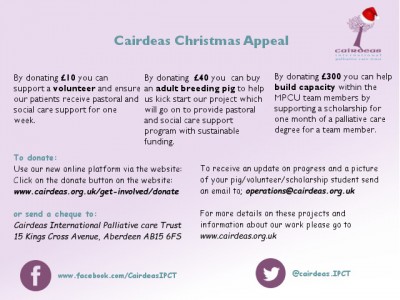
How to support us.....
Mentoring in Uganda
![]() Cairdeas
Cairdeas
![]() 16th November 2016
16th November 2016
We have been privileged to welcome mentors to Uganda as part of a Nurse Leadership Development programme which is supported by a partnership led by the University of Edinburgh and Makerere University (Palliative Care Unit) and funded by UKaid (DFID) through THET. Berit came for several months and contributed to the life of the MPCU team as well as her specific mentees. Here she talks of her experience.
'The opportunity to work in a completely different environment came right at the end of my working life. I have worked as a specialist palliative care nurse in London since 1989 and have retired three times! On my retirement from the NHS I said that my dream was to work in Africa. I never thought the dream would become true.
But here I am in Kampala. It is certainly both a professional and personal challenge. At a personal level it is about daily living – shopping, travelling, risk taking, being in a minority, time keeping and just being here without my family. At a professional level there is a range of challenges, such as the balance between being supportive and paternalistic, adapting the UK knowledge and experience with so far only quite a superficial understanding of the Ugandan reality.
It would be easy to focus on the lack of resources, training needs, perceived inefficiencies and lack of planning. However, as we talk about shared learning in mentorship relationships I would like to reflect on the learning I can bring back to the UK. I will leave the personal learning aside in this blog. Maybe in my next blog?
I strongly feel UK nurses could learn a lot from the Uganda. I am so impressed with the knowledge and experience the specialist palliative care nurses have of research, presenting papers and posters. In the UK we often say we don’t get the time to do this, but it is clear that it is a question of priorities. As many specialist nurses in the UK feel that there is a lack of career progression this could be a way forward. The investment in staff training and support in palliative care at all levels is remarkable. You visit a small hospital far from Kampala. The palliative care office is the size of a cupboard and there are the palliative care training certificates of the staff on the wall!
The nurses also have a huge sense of pride in their work. One particular image comes to mind of a palliative care nurse in small hospital proudly showing us the locked wooden cupboard for the morphine. Their resilience to work with limited resources with patients who are very ill, far from hospitals is outstanding. As a visitor you think the presenting patient and his/her needs are overwhelming, but after a consultation with the palliative care nurse you realize that a lot can be done and you see the relief of the patient and the family. This could be prescription for morphine, information about the illness, support available at home.
Finally, and I never thought I would say this as a nurse without a faith, but the prayers and in particular, the singing at the beginning of a working day or meeting is powerful. It gives you time to reflect, focus and feel part of that particular group.
A big thank you to all the nurses, clinical officers, doctors and volunteers I have met in Uganda.'
Thanks so much Berit; haste ye back!!!
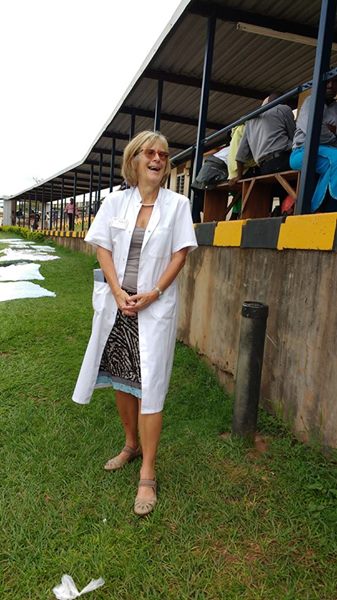
Berit

APCA 2016 Kampala
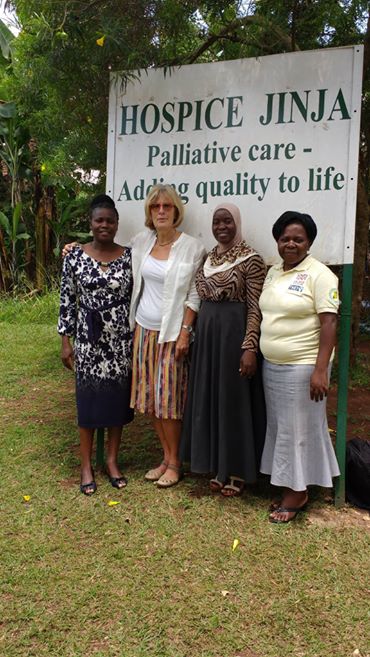
Jinja

Nuts

Thanksgiving
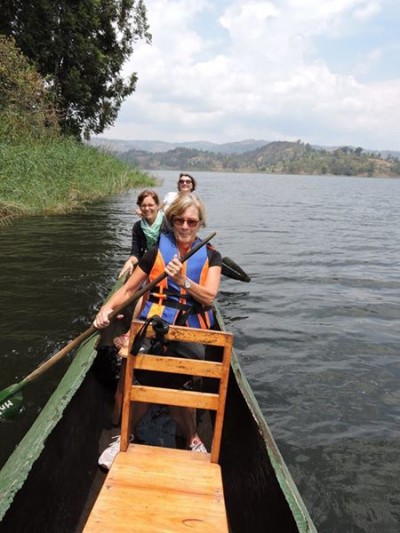
Dugout
Tales from Mauritania and Cairdeas Sahara
![]() Dr Mhoira Leng
Dr Mhoira Leng
![]() 31st October 2016
31st October 2016
Aicha is a nurse who works part-time in the palliative care project in Mauritania, West Africa. She visits patients in their homes, helps to train others and is a local advocate for palliative care. She also works as a dialysis nurse in the renal unit of the National Hospital. 'I have worked for Cairdeas Sahara, the Cairdeas project in Mauritania, for around one and a half years. I have learned a lot of things in this time and I now think of others as I have never done before. We, as a team, work hard to reduce the pain of patients and their families. It is a privilege to be present in people’s lives at the moments when they have need for palliative care. The relationships I have with my patients are more personal than ever before. I have learned how to relieve suffering of the patient and their family. I accompany the patients until the last moments of life, all the while striving to reduce their pain and comforting them in all ways possible. I have learned much about how to appropriately advise people to reduce them wasting their money on pointless acts concerning their health. We comfort them and teach them how to live with one another. We give a helping hand to the family when there is need. Before our involvement, they were isolated because of several factors - many of these reasons are because the others do not understand the illness and are frightened, or because of the nausea inducing smells. We re-establish the position of the patient in their family and community. This means to explain their condition according to what they want to know and in a way in which they can understand and accept. We try to teach the family how to cope in difficult situations, and sometimes just treating the smell of the wound can change their whole situation in the family.'
Mauritania is located where the Sahara desert meets the Atlantic ocean and it wasd a pirivlege to visist Dr Dave Fearon and the palliative care team earlier this year. It is a resource poor country and is four times the size of the UK, with a population of 3.5 million. As part of the partnership between Cairdeas International Palliative Care Trust and the Mauritanian association ‘ASSIDE’, a recent grant from THET has facilitated palliative care training events. Twenty-five health care workers travelled from the interior of the country to the capital; the furthest distance travelled was 680 miles. Ten of these participants were selected to stay for a second week to be trained as partners. The training was interactive, with a mix of short lectures, small group work, interactive activities, role play, video recording and playback of communication skills, and visiting actual palliative patients in their homes. Here is a quote from one of those traiend '‘Before the training I thought I was good at communicating with my patients, rating myself as perhaps 9 out of 10. After watching the video recording of my role play, I realised that I was really only functioning at around 4 out of 10.’
Great work being done and we will have more information and stories from Mauritania in the future including some fascinating anthropological studies. Check out the facebook page Cairdeas Sahara.

Aisha
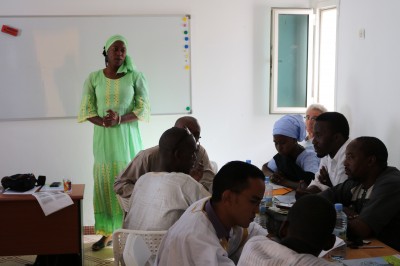
Palliative care training

Donkey transport

Sahara meets the ocean
